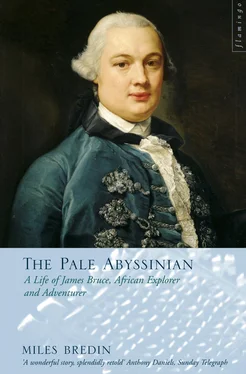This environment, designed specifically to cut the boy off from his Scottish roots, had the required effect on James. Throughout his life, although he became very proud of his ancestry and used it unashamedly when necessary, he described himself as an Englishman. On his later travels, he always had an eye open for any way his exploits might benefit the crown. In the Red Sea he would forge treaties; in Spain he would make invasion plans before admiring the sights. This adoption of England was not as odd as it seems; conditioning and distance from home apart, he was born a Lowland Scot rather than a Highlander. Highlanders were generally more interested in independence than Lowlanders and viewed their more southerly countrymen with contempt. In those days ‘Sassenach’ was not a term of abuse used by Glaswegians to describe Englishmen. It was instead used by Highlanders to describe Glaswegians and other Lowlanders. Lowlanders were often terrified of their savage neighbours who lived far more primitive lives and spoke what many considered a strange, unintelligible language. Not until Bruce was in his fifties was the legend of the proud Highlander created by his much younger acquaintance, the novelist Sir Walter Scott. When Bruce was fifteen the Highlanders were actually fighting the English and any book extolling their virtues would have been seditious.
In April 1746 James completed his studies at Harrow but the Highland purges continued in his homeland and it was deemed unwise for him to return. He was thus sent briefly to a finishing school. By April 1747, Bonnie Prince Charlie had completed his dash through the Highlands and had effected his escape to France; the bloody Duke of Cumberland had entered London as Handel termed him the ‘conquering hero’ and northern Britain was safe once more. James was able to return to Kinnaird and attempt to insinuate himself into the bosom of his father’s new family. He spent the summer hunting, a sport at which he excelled, and which would become a lifelong love. He thrived on the fresh air and his health saw a marked improvement. For six months he roamed the fields around Kinnaird, indulging his passion for blood sports; at the age of only sixteen he departed, revived, for Edinburgh University to study for the Bar.
James’s first preference had been to become an Anglican priest. Although it was a vocation for which he became entirely unsuited – he became far too combative – at this time his guardian believed him well suited to the cloth. Writing to David Bruce in 1746, William Hamilton had said:
He very modestly says, he will apply himself to whatever profession you shall direct; but he, in his own inclination, would study divinity and be a parson. The study of the law, and also that of divinity, are indeed both of them attended with uncertainty of success. But, as he inclines to the profession of a clergyman, for which he has a well-fitted gravity, I must leave it to you to give your own directions, though I think, in general, it is most advisable to comply with a young man’s inclination, especially as the profession he proposes is in every respect fit for a gentleman.
James’s ancestor, the Rev. Robert Bruce, had been a guiding light of the early Kirk; indeed in Scotland he still receives a great deal more recognition than his descendant. It would not have been seemly if the Rev. Robert’s great grandson had become a cleric of an opposing faith. This, when combined with the fact that James’s maternal grandfather was the dean of the law faculty at Edinburgh, probably led to David’s decision to overrule James and make him study for the Bar. Law – and Scottish law at that – seems an unlikely career but it was essential that James did something that would support him in later life. The family’s wealth was too thinly spread for James to live off the proceeds of the estate and, if it was necessary for him to work, the law was one of the few respectable options.
So it was that James spent the next few months reading up on the law and attending dry lectures at the university rather than studying the lives of the saints and learning how to deliver sermons. As the heavily annotated margins of the law books which he was supposed to be studying testify, he spent rather more time in the extra curricular study of Italian than on his articles. By the spring of 1748, however, he was too ill to continue. This was to mark the end of his formal education but the lust for knowledge that his studies had instilled in him would be a lifelong preoccupation. Due to the state of medical learning in the eighteenth century it is hard to know what was actually wrong with him: this was still an age when bleeding was considered a cure-all. He could have had asthma, he could merely have been growing too fast, but the symptoms which eventually led to his being forced to leave the university were a constant weakness, wheezing and shortness of breath.
In 1747, at the age of seventeen, he retired to the country and went back to his former pastimes of hunting and shooting. For five years, the weak young man wandered the moors slaughtering the local fauna, reading the Bible and teaching himself modern Romance languages. It was not until 1753 that his sojourn with nature came to an end and his character began to change. He had been heading speedily towards a life of indolent dilettantism but his physical recovery fed his ambition. At last he began to take on some of the characteristics that would help him survive in later life and to behave in a manner more suited to a man destined to become one of our greatest explorers. He recovered his health and filled out. Towering above his contemporaries and with a burly chest to match, he decided to seek his fortune in India. Though brave (fewer than half the writers who went to India returned) this was not particularly unusual. With Robert Clive in his prime, the subcontinent was already well-trodden ground. It was, however, at least a step in the right direction.
Just before he left Edinburgh on 1 August, he and William Graham were initiated into Canongate Kilwinning Lodge No. 2. The smart Edinburgh branch of the Mother Lodge at Kilwinning, Canongate – despite its secondary title – was the most influential masonic lodge in the world, a fertile sanctuary of the Enlightenment which would soon be frequented by Robert Burns, the Adam brothers, James Boswell and Sir Walter Scott. This was a significant moment in James’s career. From it stemmed his great intellectual interest in astronomy and the Arab world, his remarkable ease with foreign bankers and his almost encyclopaedic knowledge of obscure biblical works. For the time being, though, it gave him access to a vast and influential network of people who could help him in his career. He set off for London full of good intentions.
He was by then too old to join the East India Company by the traditional route as a Writer (a clerk with prospects) but had influential acquaintances and money enough to become a licensed trader. He petitioned the directors for a free trader’s permit but before it was granted he fell in love and the course of his life was once more changed. Meeting Adriana Allan, the beautiful daughter of a London wine merchant’s widow (who came with an excellent dowry), was to set him on the route which would eventually lead him by a much meandering course to ‘the coy fountains’ of the Nile.
In the mid-eighteenth century London was an influential capital but it had not yet taken on the glorious trappings of Empire. There was not a square foot of pavement in the entire city; indeed, there would not be until after Bruce returned from his travels. William Hogarth was at the height of his powers and the streets of the capital were much as he depicted them. The sale of gin had only just been restricted and rakes progressed down streets lined with harlots and steeped in ordure. The inhabitants of the city were debauched, diseased and for the most part mired in the most hideous poverty. Even extreme wealth – which at that point Bruce did not possess – could not protect the visitor from the horrors of everyday life.
Читать дальше











